永恒主义教育哲学
论永恒主义的朴素教育观
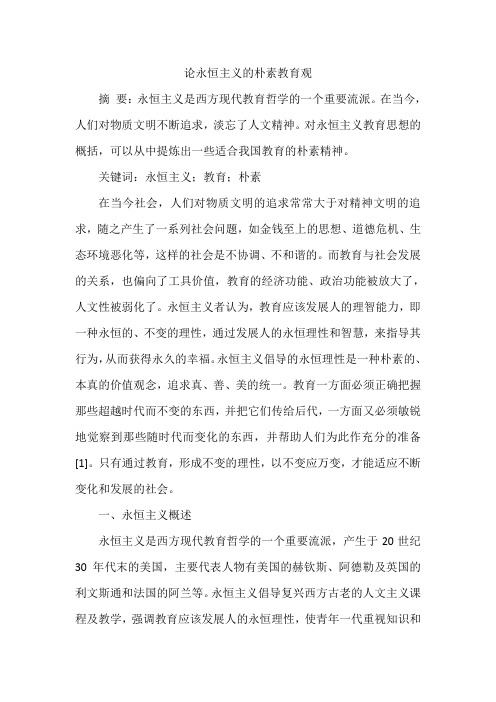
论永恒主义的朴素教育观摘要:永恒主义是西方现代教育哲学的一个重要流派。
在当今,人们对物质文明不断追求,淡忘了人文精神。
对永恒主义教育思想的概括,可以从中提炼出一些适合我国教育的朴素精神。
关键词:永恒主义;教育;朴素在当今社会,人们对物质文明的追求常常大于对精神文明的追求,随之产生了一系列社会问题,如金钱至上的思想、道德危机、生态环境恶化等,这样的社会是不协调、不和谐的。
而教育与社会发展的关系,也偏向了工具价值,教育的经济功能、政治功能被放大了,人文性被弱化了。
永恒主义者认为,教育应该发展人的理智能力,即一种永恒的、不变的理性,通过发展人的永恒理性和智慧,来指导其行为,从而获得永久的幸福。
永恒主义倡导的永恒理性是一种朴素的、本真的价值观念,追求真、善、美的统一。
教育一方面必须正确把握那些超越时代而不变的东西,并把它们传给后代,一方面又必须敏锐地觉察到那些随时代而变化的东西,并帮助人们为此作充分的准备[1]。
只有通过教育,形成不变的理性,以不变应万变,才能适应不断变化和发展的社会。
一、永恒主义概述永恒主义是西方现代教育哲学的一个重要流派,产生于20世纪30年代末的美国,主要代表人物有美国的赫钦斯、阿德勒及英国的利文斯通和法国的阿兰等。
永恒主义倡导复兴西方古老的人文主义课程及教学,强调教育应该发展人的永恒理性,使青年一代重视知识和修养,从而为将来的生活做准备。
永恒主义来源于西方古典人文主义,代表的是西方古典的教育学说,和学新将其思想基础主要来源分为以下三方面内容。
第一,永恒主义认为,存在一种永恒的绝对的实在,这个实在在任何时间、任何地点都是同一的。
物质世界是永恒的,人的本性也是永恒的。
永恒主义的代表人物赫钦斯指出,在不断发展人类文明长河中,一直存在一种主宰着人类社会发展和变化的隐性规律,是一种永恒不变的客观规律,这种规律就是人不变的理性。
第二,不变的永恒的人性观。
永恒主义认为,人类区别于动物的最大特征在于人类具有理性。
教育哲学的主要流派及其对当代教育的启示
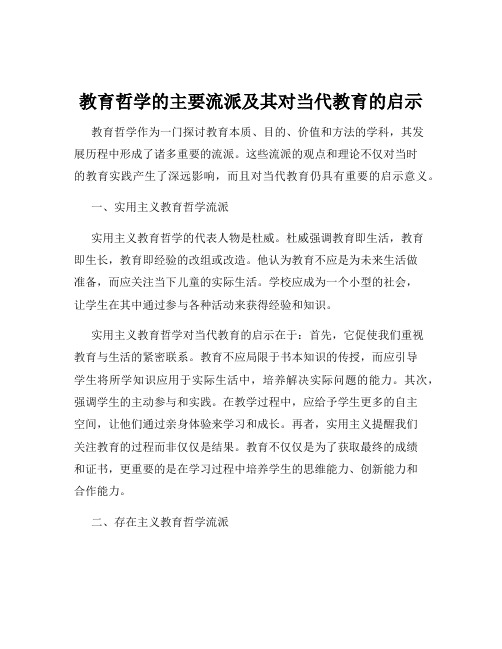
教育哲学的主要流派及其对当代教育的启示教育哲学作为一门探讨教育本质、目的、价值和方法的学科,其发展历程中形成了诸多重要的流派。
这些流派的观点和理论不仅对当时的教育实践产生了深远影响,而且对当代教育仍具有重要的启示意义。
一、实用主义教育哲学流派实用主义教育哲学的代表人物是杜威。
杜威强调教育即生活,教育即生长,教育即经验的改组或改造。
他认为教育不应是为未来生活做准备,而应关注当下儿童的实际生活。
学校应成为一个小型的社会,让学生在其中通过参与各种活动来获得经验和知识。
实用主义教育哲学对当代教育的启示在于:首先,它促使我们重视教育与生活的紧密联系。
教育不应局限于书本知识的传授,而应引导学生将所学知识应用于实际生活中,培养解决实际问题的能力。
其次,强调学生的主动参与和实践。
在教学过程中,应给予学生更多的自主空间,让他们通过亲身体验来学习和成长。
再者,实用主义提醒我们关注教育的过程而非仅仅是结果。
教育不仅仅是为了获取最终的成绩和证书,更重要的是在学习过程中培养学生的思维能力、创新能力和合作能力。
二、存在主义教育哲学流派存在主义教育哲学主张教育要关注人的存在,强调个体的自由选择和自我实现。
它认为教育的目的是帮助学生认识自己,发展个人的独特性和自主性。
存在主义对当代教育的重要启示有:其一,尊重学生的个性和独特性。
每个学生都是独一无二的个体,教育应当因材施教,充分发挥每个学生的潜能。
其二,培养学生的自主意识和责任感。
让学生明白自己的选择和行为所带来的后果,从而学会对自己的人生负责。
其三,强调师生之间的平等对话和交流。
教师不再是知识的权威传授者,而是与学生共同探索人生意义的伙伴。
三、永恒主义教育哲学流派永恒主义教育哲学认为教育的本质是永恒不变的,应当关注那些具有永恒价值的知识和真理。
这些永恒的知识包括人类历史上的经典著作和伟大思想。
其对当代教育的启示包括:重视经典文化的传承。
经典作品蕴含着人类智慧的结晶,通过学习经典,可以培养学生的批判性思维和深厚的文化素养。
永恒主义教育的主要观点
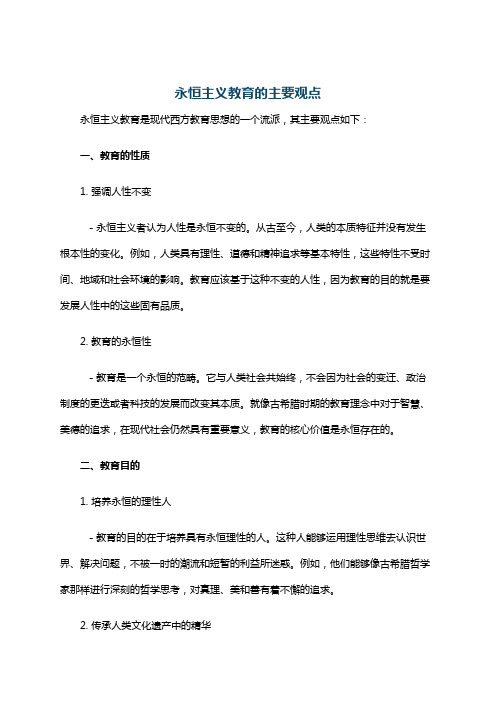
永恒主义教育的主要观点永恒主义教育是现代西方教育思想的一个流派,其主要观点如下:一、教育的性质1. 强调人性不变- 永恒主义者认为人性是永恒不变的。
从古至今,人类的本质特征并没有发生根本性的变化。
例如,人类具有理性、道德和精神追求等基本特性,这些特性不受时间、地域和社会环境的影响。
教育应该基于这种不变的人性,因为教育的目的就是要发展人性中的这些固有品质。
2. 教育的永恒性- 教育是一个永恒的范畴。
它与人类社会共始终,不会因为社会的变迁、政治制度的更迭或者科技的发展而改变其本质。
就像古希腊时期的教育理念中对于智慧、美德的追求,在现代社会仍然具有重要意义,教育的核心价值是永恒存在的。
二、教育目的1. 培养永恒的理性人- 教育的目的在于培养具有永恒理性的人。
这种人能够运用理性思维去认识世界、解决问题,不被一时的潮流和短暂的利益所迷惑。
例如,他们能够像古希腊哲学家那样进行深刻的哲学思考,对真理、美和善有着不懈的追求。
2. 传承人类文化遗产中的精华三、课程内容1. 古典学科为核心- 永恒主义者主张以古典学科为课程内容的核心。
古典学科涵盖了古典语言(如拉丁语、希腊语)、古典文学、古代历史等。
他们认为这些古典学科能够提供最有价值的知识,有助于培养学生的理性思维和高尚情操。
例如,学习拉丁语可以提高学生的语言分析能力和对语言结构的理解,同时通过阅读古罗马文学作品,还能领略到古代文化的魅力。
2. 名著课程- 倡导名著课程。
名著是经过历史筛选的具有极高价值的著作。
学生通过阅读名著,如莎士比亚的戏剧、托尔斯泰的小说等,可以跨越时空与伟大的思想家、文学家进行对话。
名著课程能够使学生深入了解人类的思想、情感和价值观的演变,拓宽他们的视野,提高他们的文化素养。
四、教学方法1. 教师中心- 永恒主义教育强调教师在教学过程中的中心地位。
教师是知识的传授者和学生道德的引导者。
教师应该具有深厚的学术素养,能够准确地讲解经典著作中的知识和思想。
当代西方教育流派介绍三(新传统教育3)

第四节
新托马斯主义教育思潮
新托马斯主义是西方以基督教为基础倡导宗 教教育的现代教育思想流派。其教育理论直接 建立在新托马斯主义的哲学世界观上,把宗教 教育作为教育的核心和最高目标,主张各级各 类的学校都应进行宗教训练,以培养“真正的 基督徒”和“有用的公民”。
一、新托马斯主义教育派的思想渊源
现代社会所缺乏的精神营养,在利文斯通看来, 可以从古希腊和基督教的文明传统中吸取。 利文斯通指出古典教育最好的途径是需要读原 著,这就需要学习希腊语和拉丁语。此外,利 文斯通认为古典语言中所包含的价值在于它对 人生观的培养,这是其他现代语言所无法比拟 的。
阿兰(Alain,1868-1951)是德国哲学家、散 文家、教育家。 阿兰对西方现代教育理论热衷于儿童的发展阶 段、兴趣、本能等的倾向极为不满。阿兰指出, 学习不同于游戏,学习是艰苦的劳动而不是玩 七巧板或吃蜜饯。教师的责任就在于要给儿童 提出严格的要求,教师在树立威信的同时,阿 兰还主张要对儿童辅之以家长对孩子般的温情, 两者结合、协调一致会产生更好的教育效果。 阿兰是古典主义教育的热情鼓吹者,极力主张 现代学校应把古典语言和经典著作作为学习内 容。
新托马斯主义是天主教在当代最有权威的神学哲学, 起源于圣托马斯•阿奎那在13世纪创造的“经院哲 学”。 “新托马斯主义”一词是由卢汶高等哲学研究所率 先提出的。卢汶高等哲学研究所在其创办的《新经 院哲学评论》杂志1894年出版的第一期上,登载 了《新经院哲学》一文,正式提出了“新经院哲学” 和“新托马斯主义”概念。这是新托马斯主义哲学 形成的标志。 20世纪30年代,以法国天主教神学家马里坦为代 表的一批学者,以新托马斯主义哲学为理论依据, 建立了基于宗教哲学的教育理论,这派教育理论便 被称为新托马斯主义教育理论。
永恒主义教育哲学产生背景代表人物哲学基础

二、永恒主义教育思潮的主要代表人物
赫钦斯(robert maynard hutchins,1899—1977)是美国 教育家,永恒主义教育流派的代表人物。1899年1月17 日,他出生于美国纽约布鲁克林区的一个神学教授的 家庭。赫钦斯自1923年起在耶鲁大学任教,1928年担任 耶鲁大学法学院院长;1929年,担任芝加哥大学校长, 推行“芝加哥计划”,对这所大学进行改革;与此同 时,他又推行“名著教育计划”,并专门设立了“西 方名著编纂咨询委员会”;1937年,担任马里兰州圣 约翰学院的兼职董事,帮助该学院实施以名著教育为 主的教育计划;1951年担任福特基金会副主席。 1977 年5月14日,赫钦斯因病去世。他的主要教育著作有: 《民主社会教育中的冲突》、《美国高等教育》、 《为自由而教育》、《教育中的冲突》等。
Page 2
本章内容
永恒主义教育的产生、 代表人物及理论基础
永恒主义教育哲学 的基本主张 永恒主义教育哲学 的评价及其启示
Page 3
第一节 永恒主义教育的产生、代表人物及理论基础
一、永恒主义教育的产生与发展
二、永恒主义教育的代表人物
三、永恒主义教育的理论基础
Page
4
一、永恒主义教育的产生
社会背景
永恒主义与进步主义、要素主义的区别
比较项目 进步主义 要素主义 永恒主义
主要特征
进步
保守
复古
社会和文化的 都承认变化,都强调用 从根本上否认世界是 看法 知识来解决现实世界所 变化的说法,变化只 面临的问题,都不太重 是表面现象,而控制 视对人文学科所包含的 世界的根本原则是永 价值和理论的理解 恒的、不变的。
Page 14
三、永恒主义教育思潮的思想基础
教育哲学——永恒主义

——赫钦斯
甘肃民族师范学院
教育科学系 谭忠科
目录
1 2 3 4
代表人物 理论要点 评价
启示 启示
1
代表人物——赫钦斯
简历:1925年获得耶鲁大学法学学士学位。历任法
学教授、法学院院长等职。1929-1951年间任芝加
哥大学校长。退休后,任福特基金会副主席之职。
成就:赫钦斯是美国著名的教育家,公认的复兴人
指 导ቤተ መጻሕፍቲ ባይዱ思 想 上
强调名著阅读 的民主性。
方 教 强调大众化, 式育 上 和 并和商业化模 传 式结合起来。 播
标识性观点
永恒主义强调普遍真理和价值。
人的本质的基本特点无论时间与地点都重复 出现于每一代人。 和人的本质一样,教育的基本目标是普遍的、
无时间界限的。
人类所储存的智慧被记录在某些经典的著作 中。极力推荐通过阅读名著的形式进行学习。 反对教师教育中出现的专业化,认为未来的 教师应该接受良好的人文和科学的普通教育。
文主义的领导人。
主要作品:《为自由而教育》、《教育中的冲突》、
《美国高等教育》、《学习社会》
2
理论要点
基本立场 主要特征
在这里添加标题内容
标识性观点
基本立场
主要特征
强调名著与 现代社会的 契合 将名著作为历 史的遗存,用 现代人编撰的 观念范畴去整 理它们。
基 本 原 则 上 编 排 方 式 上
3
评价
永恒主义通过名著运动而来。将名著的 研读与现代社会的生活斱式、组织结构、 乃至商业性活动的模式结合起来,成为 一种社会或群体的阅读经历和共同记忆。
重新理解经典在当代的现实价值 和意义。
4
教育哲学的主要流派与思想
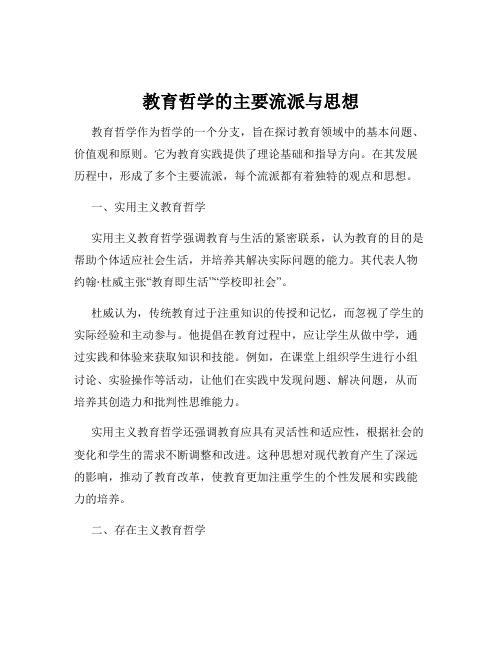
教育哲学的主要流派与思想教育哲学作为哲学的一个分支,旨在探讨教育领域中的基本问题、价值观和原则。
它为教育实践提供了理论基础和指导方向。
在其发展历程中,形成了多个主要流派,每个流派都有着独特的观点和思想。
一、实用主义教育哲学实用主义教育哲学强调教育与生活的紧密联系,认为教育的目的是帮助个体适应社会生活,并培养其解决实际问题的能力。
其代表人物约翰·杜威主张“教育即生活”“学校即社会”。
杜威认为,传统教育过于注重知识的传授和记忆,而忽视了学生的实际经验和主动参与。
他提倡在教育过程中,应让学生从做中学,通过实践和体验来获取知识和技能。
例如,在课堂上组织学生进行小组讨论、实验操作等活动,让他们在实践中发现问题、解决问题,从而培养其创造力和批判性思维能力。
实用主义教育哲学还强调教育应具有灵活性和适应性,根据社会的变化和学生的需求不断调整和改进。
这种思想对现代教育产生了深远的影响,推动了教育改革,使教育更加注重学生的个性发展和实践能力的培养。
二、存在主义教育哲学存在主义教育哲学关注个体的存在和自由选择。
它认为教育的本质是帮助学生认识自己的存在,做出自由的选择,并对自己的选择负责。
存在主义强调个人的主观性和独特性,认为每个学生都是独一无二的存在。
教育不应将学生视为标准化的产品,而应尊重他们的个性和差异。
在教学过程中,教师应与学生建立平等的对话关系,鼓励学生表达自己的想法和感受。
例如,在课程设置上,存在主义教育哲学主张提供多样化的课程选择,让学生根据自己的兴趣和爱好来决定学习的内容。
同时,教育还应培养学生的勇气和责任感,使他们能够在面对生活中的困难和挑战时,勇敢地做出选择,并承担相应的后果。
三、永恒主义教育哲学永恒主义教育哲学主张教育应该传授永恒的真理和价值,培养学生的理性思维和道德品质。
其代表人物有罗伯特·哈钦斯和莫蒂默·阿德勒。
永恒主义者认为,人类历史上存在着一些永恒不变的真理和价值,如正义、善良、智慧等。
永恒主义教育

•
教师发挥主导作用
•
发挥学生学习的能动性
•
引起学生不断反思
•
培养和发展学生理性
三、永恒主义教育评析
•
对进步主义教育的批判
•
弥补了进步教育改革带来的问题与弊端
•
对美国高等教育和成人教育的影响
•
不利于现代社会所需人才的培养
•
忽略了人的身体和情感方面的教育
(1988) 利文斯通《保卫古典教育》(1916)
赫钦斯——代表人物
Robert Maynard Hutchins 1899—1977 芝加哥大学校igher Learning in
America 2001年浙江教育出版社
一、永恒主义教育形成的背景
• 进步教育和实用主义教育本身的缺陷 • 美国20年代末的经济危机 • 社会经济问题呈恶化趋势
二、永恒主义教育的主要观点
• (一)教育的性质永恒不变
•
欧洲古典实在论哲学
•
永恒不变的实在
•
人自身存在着永恒不变的特性
•
——理性
•
教育及其性质具有永恒性
(二)教育的目的是培养和发展人的理性
•
理性是人的本质力量之所在
(四)教育内容是永恒的古典学科
•
永恒学科:稳定不变
•
适用于任何时代、任何人
•
西方经典名著
•
集名人思想之精华
•
超越时空
•
涵盖一切知识领域
•
人和事物本质最深刻的见解
(五)通过教学进行学习:有效的教学方法
• 积极思考是一种有效的理智训练的方法
• 锻炼思维、培养和发展人的理智
• 阿德勒:通过教学进行学习
永恒主义教育思想
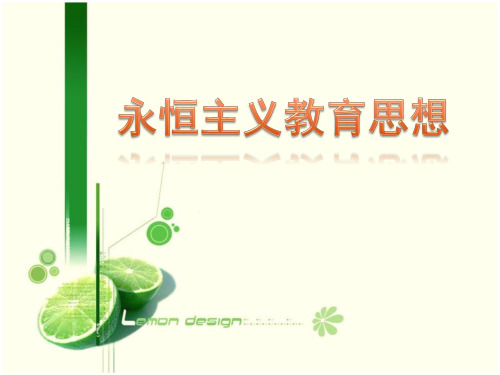
学习的方法
提倡通过教学进行学习
永恒主义教育家认为,儿童的学习既然是为了开发他们内在的潜能, 发展他们的理性,就应该通过教师的教学,激发学生的思维活动和理智训练。 特别是在学习古典名著时,更需要在教师的指导下,让学生自己阅读和讨论, 才能使学生深刻理解名著的内容,并认定一些伟大的思想家作为自己的榜样, 像他们那样去思考。 在教育方法上:反对灌输,反对填鸭式的教育;发挥家长作用,督促、 鼓励孩子多做家庭作业。永恒主义者关于教学方法方面的主张中,最有特色 的是苏格拉底的问答法和读书。
社会背景
20世纪30年代初,西方资本主义国家爆发了长 时间的经济危机。经济上的滑坡带来了证据上的动 荡。30年代中后期,德国、意大利、日本等国相继 建立法西斯政权,社会局面动荡不安。
教育背景
进步主义教育运动在美国公立学校处于主导 地位,但它对这种社会政治经济危机却束手无策。 它所提倡的那种漫无目的、杂乱无章的组织形式
强调幸福不能作为教育的根本目的,这样容易使 教育活动 、政治活动和军事活动等混淆起来。认为教 育的一个目的是把人塑造成人,教育意味着教学,教学 意味着知识,知识意味着真理,真理意味着永恒。
永恒主义教育的思想基础
3. “复古”的社会观
永恒主义者反对近代实验科学,认为科学固然可以确定事实,给
人以力量,然而科学并不能告诉我们发展、变化的目标,科学本身也
需要和社会改造三种教育
目的的批判更能体现出永 恒教育的目的。
对永恒主义教育思想的评价
1.永恒主义教哲学的理论前提是 世界的永恒性和人性的不变性, 从而认为教育的目的就是认识世
3.片面强调了人文主义、人文知
识的地位和价值,贬低了科学理 论的地位和作用,在永恒主义的 课程和教材中,自热科学课程是 被列入黑名单的。
永恒主义教育思想
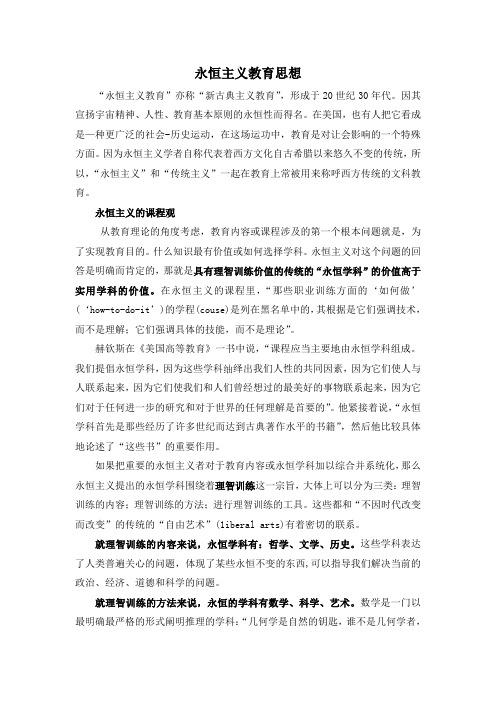
永恒主义教育思想“永恒主义教育”亦称“新古典主义教育”,形成于20世纪30年代。
因其宣扬宇宙精神、人性、教育基本原则的永恒性而得名。
在美国,也有人把它看成是—种更广泛的社会-历史运动,在这场运功中,教育是对让会影响的一个特殊方面。
因为永恒主义学者自称代表着西方文化自古希腊以来悠久不变的传统,所以,“永恒主义”和“传统主义”一起在教育上常被用来称呼西方传统的文科教育。
永恒主义的课程观从教育理论的角度考虑,教育内容或课程涉及的第一个根本问题就是,为了实现教育目的。
什么知识最有价值或如何选择学科。
永恒主义对这个问题的回答是明确而肯定的,那就是具有理智训练价值的传统的“永恒学科”的价值高于实用学科的价值。
在永恒主义的课程里,“那些职业训练方面的‘如何做’(‘how-to-do-it’)的学程(couse)是列在黑名单中的,其根据是它们强调技术,而不是理解;它们强调具体的技能,而不是理论”。
赫钦斯在《美国高等教育》一书中说,“课程应当主要地由永恒学科组成。
我们提倡永恒学科,因为这些学科绎出我们人性的共同因素,因为它们使人与人联系起来,因为它们使我们和人们曾经想过的最美好的事物联系起来,因为它们对于任何进一步的研究和对于世界的任何理解是首要的”。
他紧接着说,“永恒学科首先是那些经历了许多世纪而达到古典著作水平的书籍”,然后他比较具体地论述了“这些书”的重要作用。
如果把重要的永恒主义者对于教育内容或永恒学科加以综合并系统化,那么永恒主义提出的永恒学科围绕着理智训练这一宗旨,大体上可以分为三类:理智训练的内容;理智训练的方法;进行理智训练的工具。
这些都和“不因时代改变而改变”的传统的“自由艺术”(1iberal arts)有着密切的联系。
就理智训练的内容来说,永恒学科有:哲学、文学、历史。
这些学科表达了人类普遍关心的问题,体现了某些永恒不变的东西,可以指导我们解决当前的政治、经济、道德和科学的问题。
就理智训练的方法来说,永恒的学科有数学、科学、艺术。
教育哲学的主要流派与思想
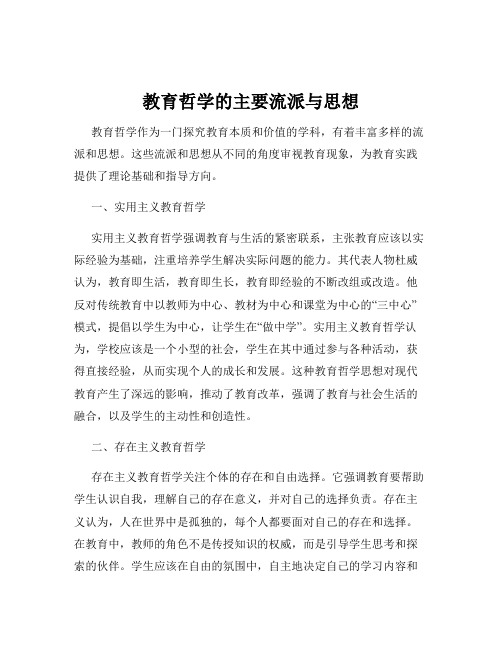
教育哲学的主要流派与思想教育哲学作为一门探究教育本质和价值的学科,有着丰富多样的流派和思想。
这些流派和思想从不同的角度审视教育现象,为教育实践提供了理论基础和指导方向。
一、实用主义教育哲学实用主义教育哲学强调教育与生活的紧密联系,主张教育应该以实际经验为基础,注重培养学生解决实际问题的能力。
其代表人物杜威认为,教育即生活,教育即生长,教育即经验的不断改组或改造。
他反对传统教育中以教师为中心、教材为中心和课堂为中心的“三中心”模式,提倡以学生为中心,让学生在“做中学”。
实用主义教育哲学认为,学校应该是一个小型的社会,学生在其中通过参与各种活动,获得直接经验,从而实现个人的成长和发展。
这种教育哲学思想对现代教育产生了深远的影响,推动了教育改革,强调了教育与社会生活的融合,以及学生的主动性和创造性。
二、存在主义教育哲学存在主义教育哲学关注个体的存在和自由选择。
它强调教育要帮助学生认识自我,理解自己的存在意义,并对自己的选择负责。
存在主义认为,人在世界中是孤独的,每个人都要面对自己的存在和选择。
在教育中,教师的角色不是传授知识的权威,而是引导学生思考和探索的伙伴。
学生应该在自由的氛围中,自主地决定自己的学习内容和方式。
这种教育哲学鼓励学生勇敢面对生活中的不确定性和挑战,培养其独立思考和自主决策的能力。
然而,存在主义教育哲学也存在一定的局限性,例如过于强调个体的自由选择,可能会忽视社会规范和集体价值。
三、永恒主义教育哲学永恒主义教育哲学主张教育的目的在于传授永恒的真理和价值。
它认为人类文明中存在着一些永恒不变的核心知识和价值,如哲学、历史、文学、艺术等,这些是人类智慧的结晶,应该成为教育的重点内容。
永恒主义教育哲学强调通过经典的阅读和思考,培养学生的理性思维和道德品质。
它反对教育的功利性和实用性,认为教育应该超越当下的需求,追求更高的精神境界。
尽管永恒主义教育哲学在一定程度上保留了人类文化的精华,但也因其过于强调传统知识,而对现代科学技术和社会变化的关注不足,受到了一些批评。
名词解释永恒主义教育

名词解释永恒主义教育
永恒主义教育是一种教育理念,其核心思想是注重培养学生的永
恒价值观和全面素养,使他们在道德、智慧和品格方面得到全面发展。
这种教育追求的目标是培养具备人文情怀、积极进取、批判思维和社
会责任感的个体,使他们能够适应社会的变革和面对未来的挑战。
永
恒主义教育注重培养学生的基本功和道德品质,通过提供综合素质教
育和传授人文科学知识来培养学生的智力、品德和情感等方面的全面
发展。
这种教育主张学生从小就要注重追求真理、培养良好的品格和
道德行为,以及增强社会责任感,并通过培养学生的批判性思维能力
和创造性办法,使他们能够独立思考和解决问题。
总之,永恒主义教
育是一种追求学生全面发展、追求真理和提高人文品质的教育理念。
现代西方教育思流流派-永恒主义
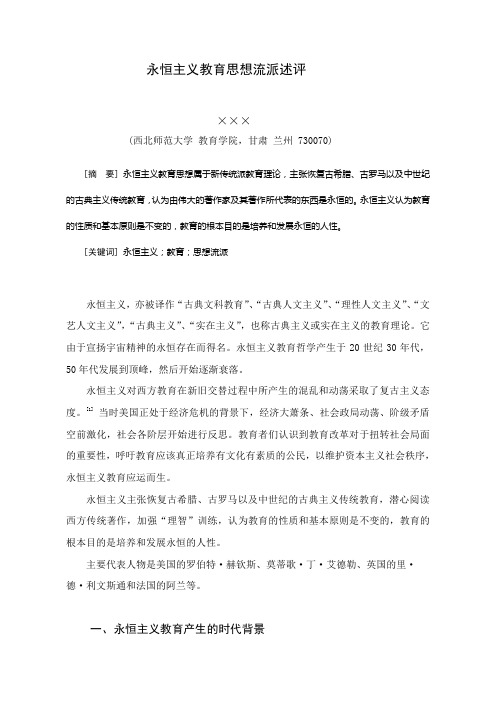
永恒主义教育思想流派述评×××(西北师范大学教育学院,甘肃兰州 730070)[摘要] 永恒主义教育思想属于新传统派教育理论,主张恢复古希腊、古罗马以及中世纪的古典主义传统教育,认为由伟大的著作家及其著作所代表的东西是永恒的。
永恒主义认为教育的性质和基本原则是不变的,教育的根本目的是培养和发展永恒的人性。
[关键词] 永恒主义;教育;思想流派永恒主义,亦被译作“古典文科教育”、“古典人文主义”、“理性人文主义”、“文艺人文主义”,“古典主义”、“实在主义”,也称古典主义或实在主义的教育理论。
它由于宣扬宇宙精神的永恒存在而得名。
永恒主义教育哲学产生于20世纪30年代,50年代发展到顶峰,然后开始逐渐衰落。
永恒主义对西方教育在新旧交替过程中所产生的混乱和动荡采取了复古主义态度。
[1]当时美国正处于经济危机的背景下,经济大萧条、社会政局动荡、阶级矛盾空前激化,社会各阶层开始进行反思。
教育者们认识到教育改革对于扭转社会局面的重要性,呼吁教育应该真正培养有文化有素质的公民,以维护资本主义社会秩序,永恒主义教育应运而生。
永恒主义主张恢复古希腊、古罗马以及中世纪的古典主义传统教育,潜心阅读西方传统著作,加强“理智”训练,认为教育的性质和基本原则是不变的,教育的根本目的是培养和发展永恒的人性。
主要代表人物是美国的罗伯特·赫钦斯、莫蒂歌·丁·艾德勒、英国的里·德·利文斯通和法国的阿兰等。
一、永恒主义教育产生的时代背景(一)资本主义危机加深1929年,美国最先爆发经济危机,其后资本主义国家相继卷入经济危机之中。
此次危机沉重打击了美国经济,影响了工业、农业、财经等行业的发展。
经济萧条,工厂倒闭,工人失业,农民破产,失业人数增加,道德滑坡,犯罪人数增加。
经济上的危机激化了社会矛盾,资本主义政权岌岌可危。
(二)进步主义无法解决当时的社会问题进步主义教育在当时的美国教育处于主导地位,然而进步主义无力解决资产阶级社会的突出问题。
永恒主义教育哲学的基本主张

2.教学方法
永恒主义者关于具体教学方法的论述有: 反对灌输,反对填鸭式的记忆; 发挥家长作用,督促、鼓励孩子多做家庭作业; 严格要求,“沉思”的学习方法,教室有修道院气氛等。
永恒主义者关于教学方法方面的主张中,最有特色的 是苏格拉底的问答法和读书。
Page 20
通过交流、对话、讨论探索永恒真理,从根本上避免了 知识、道德观念的灌输,完全符合人性发展的规律。
任何时代,任何地方的儿童都具有一 种普遍的、共同的本性
Page 3
2. 教育的目的是发展人的本性,把人塑造成 人
永恒主义对教育目的的论述有一个重要的前提,即 教育乃是人类的一种活动,是人类许多活动的一个 方面,因此,对教育目的的论述应该局限于教育这 种活动的范围之内。
永恒主义认为,教育的目的是发展那些使人同动物 区别开来的根本特征,即人之所以为人的特征,把 人塑造成为人。
Page 9
永恒主义者认为的名著:
根据拉格的说法,永恒主义者提出的名著有一百本左 右,其中四分之三写于1800年前,三分之二写于1700年 前,只有两本是20世纪的。美国人写的只有一本,即詹 姆斯(William James)的《心理学原理》。近100年来欧洲 人写的著作只有两本,即马克思的《资本论》和弗洛伊 德的《癔病研究》。其余的多为古典的哲学、文学、历 史等人文学科方面的著作,也有部分自然科学方面的, 其中多数为古希腊和罗马时期的作品。例如古希腊诗人 荷马的《伊利亚特》,古希腊戏剧家埃斯库罗斯的《阿 加绵农》,古希腊历史学家修昔底德的《伯罗奔尼撒战 争史》,柏拉图和亚里士多德的哲学著作,欧几里德的 《几何原理》,中世纪的有阿奎那的《神学大全》,近 代的有牛顿的《原理》,麦克斯威尔的《电磁学》,莎 士比亚的戏剧作品,黑格尔的哲学著作等。
永恒主义教育思想
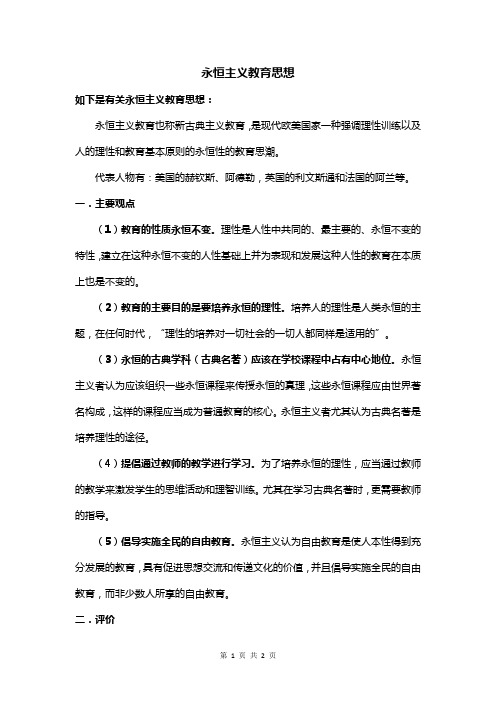
永恒主义教育思想如下是有关永恒主义教育思想:永恒主义教育也称新古典主义教育,是现代欧美国家一种强调理性训练以及人的理性和教育基本原则的永恒性的教育思潮。
代表人物有:美国的赫钦斯、阿德勒,英国的利文斯通和法国的阿兰等。
一.主要观点(1)教育的性质永恒不变。
理性是人性中共同的、最主要的、永恒不变的特性,建立在这种永恒不变的人性基础上并为表现和发展这种人性的教育在本质上也是不变的。
(2)教育的主要目的是要培养永恒的理性。
培养人的理性是人类永恒的主题,在任何时代,“理性的培养对一切社会的一切人都同样是适用的”。
(3)永恒的古典学科(古典名著)应该在学校课程中占有中心地位。
永恒主义者认为应该组织一些永恒课程来传授永恒的真理,这些永恒课程应由世界著名构成,这样的课程应当成为普通教育的核心。
永恒主义者尤其认为古典名著是培养理性的途径。
(4)提倡通过教师的教学进行学习。
为了培养永恒的理性,应当通过教师的教学来激发学生的思维活动和理智训练。
尤其在学习古典名著时,更需要教师的指导。
(5)倡导实施全民的自由教育。
永恒主义认为自由教育是使人本性得到充分发展的教育,具有促进思想交流和传递文化的价值,并且倡导实施全民的自由教育,而非少数人所享的自由教育。
二.评价永恒主义教育强调人的理性,强调阅读经典名著,有着较突出的复古主义倾向。
其在教育实践领域的影响不大,主要限于大学和上层知识界中的少数人,特别是永恒主义教育的复古态度把学生的学习限于古典著作,遭到许多人的批判。
三.对当代教育的影响(1)在教育目的方面,追求人的理性精神和价值。
教育的目的不仅要培养适应社会生活的人,而且要发现和发掘人的“理性能力”,在此基础上去培养和造就改造社会生活的人,也是具有实践意义和实践能力,能超越现实世界、现实社会的人。
(2)在教育内容方面,利用古典名著的价值。
我国五千年的灿烂文明给我们留下了宝贵的文化遗产和精神财富。
为此,教育必须挖掘优秀的文化遗产和传统思想,赋予其新意,加以改造和利用,以此来推动当今文明的建设。
教育哲学流派之三--永恒主义(修改版)
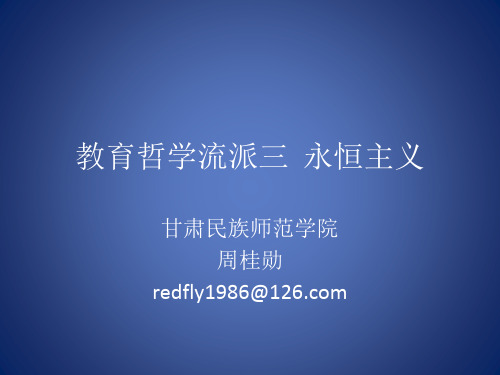
• 在永恒主义者看来,获得个人美好生活的 手段也是达到美好社会的手段。只有当人
们追求真、善、美时,才有可能获得真正 的幸福和真正美好的社会。
3.永恒原则只有通过自由艺术的教育 才能获得
• 永恒主义认为,重要的生活真理并不体现 在经验科学之中。哲学、宗教以及体现永 恒原则的人文学科的地位应该置于科学之 上。
• 永恒主义作为现代的一种教育哲学流派,是在 反对进步主义的过程中勃然兴起的,而且永恒 主义者和进步主义教育之间的论争也有声有色、 声势浩大,一直持续到第二次大战只有。
• 这也吸引了许多大学讲授古典著作的教授,如 诺克(《美国的教育学说》)、巴比特(《人 文主义和美国》)、莫尔(希腊传统)、福尔 斯特(《美国的州立大学》)、海特(《教学 的艺术》)和埃利奥特(《对一种文化定义的 注释》)以及英国的利文斯通(《保卫古典语 言》《论教育》)。
• 在教育方面,柏拉图强调让受教育者理解 高级理念的意义,为此要加强理智的训练。
• 在认识论方面,柏拉图提出了“回忆说”。
• 在他看来,教师的根本作用在于帮助学生 回忆理念世界,所以柏拉图认为,所谓学 习的人就是在回想的人,而所谓学习只不 过是回忆罢了。
• 柏拉图认为,真正的教育不能仅仅限于知识的 传送和技能的训练,它必须使人从偏见、狭隘 的见识,尤其是从经验的狭隘性和偏见中解放 出来,使他的灵魂获得自由。只有这样的教育 才真正称得上是“自由教育”。
第二节 永恒主义教育的产生及其 “复古”特征
• 一、永恒主义教育的产生及发展
• 在20世纪20年代,在美国一些学院和大学 讲授经典著作的“不受约束”的青年教师 形成了一个小团体,其中核心人物是赫钦 斯(Hutchins),人称神童,29岁任耶鲁大 学法学院院长、30岁任芝加哥大学校长; 艾德勒(Adler);哲学教授布坎南 (Buchana)、巴尔、多琳和麦克凯恩。
试析永恒主义教育哲学观——对赫钦斯、阿兰、阿德勒教育哲学观点的再认识
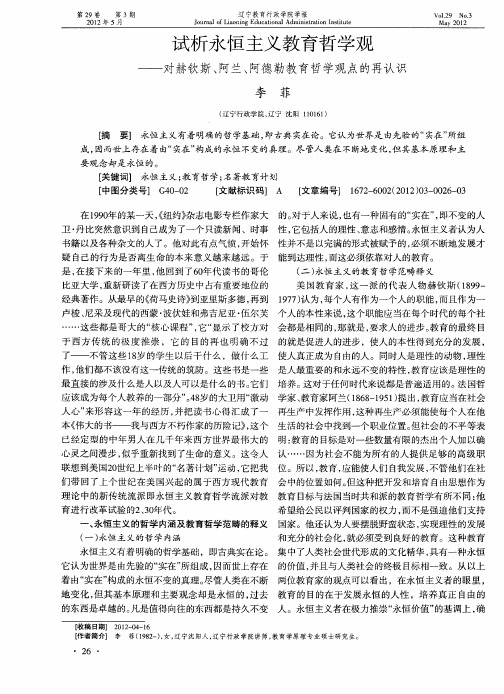
经典著作 。从最早 的《 荷马史诗》 到亚里斯多德 , 再到 17 ) 为 , 个人 有作 为一 个人 的职 能 , 97 认 每 而且 作 为一 卢梭 、 尼采及现代的西蒙 ・ 波伏娃和弗吉尼亚 ・ 伍尔芙 个人 的本 性来说 , 个 职能应 当在每 个 时代 的每 个社 这
… …
这些都是哥大的“ 核心课程” 它“ , 显示 了校方对 会都是相同的, 那就是 , 要求人的进步 。 教育的最终 目
于西方传 统 的极 度推崇 ,它 的 目的再也 明确不 过 的就是促进人的进步 , 使人的本性得到充分的发展 ,
了—— 不 管 这 些 1岁 的学 生 以后 干 什 么 ,做 什 么 工 使人 真正 成为 自由的人 。 同时人 是理 性 的动 物 , 8 理性 作 , 们 都不该 没 有这 一传 统 的筑 防 。这些 书是 一些 是人 最重 要 的和永 远不 变 的特性 , 他 教育 应 该是 理 性 的 最 直 接 的涉及 什么 是人 以及 人可 以是 什么 的书 。 它们 培养 。这对 于任何 时代 来 说都 是普 遍适 用 的 。 国哲 法 应 该 成为 每 个人教 养 的一部 分 ”4岁 的大 卫用 “ 动 学家 、 。8 激 教育 家 阿兰 (8 8 15 ) 出 , 育应 当在 社会 16 —9 1提 教 人 心 ” 形 容 这一 年 的 经历 , 把 读 书 心得 汇 成 了一 再 生 产 中发挥作 用 , 来 并 这种 再生 产必 须 能使 每个 人 在他
在19 年的某一天,纽约》 90 《 杂志电影专栏作家大 的 。 于人来 说 , 对 也有 一种 固有 的“ 在 ” 即不 变 的人 实 ,
永恒主义教育哲学
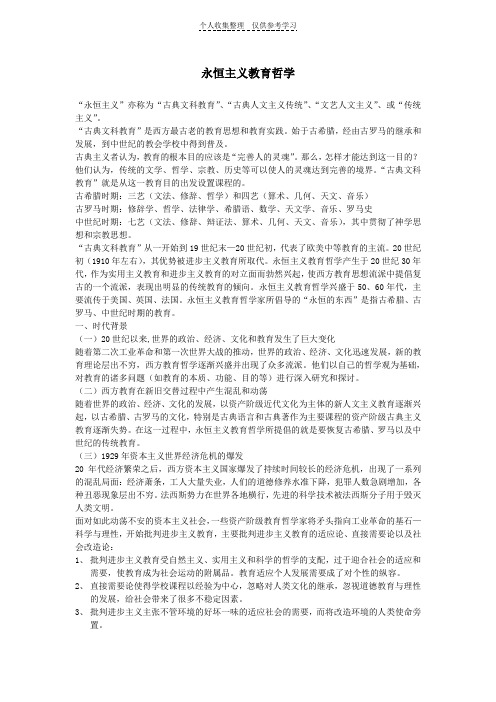
永恒主义教育哲学“永恒主义”亦称为“古典文科教育”、“古典人文主义传统”、“文艺人文主义”、或“传统主义”。
“古典文科教育”是西方最古老的教育思想和教育实践。
始于古希腊,经由古罗马的继承和发展,到中世纪的教会学校中得到普及。
古典主义者认为,教育的根本目的应该是“完善人的灵魂”。
那么,怎样才能达到这一目的?他们认为,传统的文学、哲学、宗教、历史等可以使人的灵魂达到完善的境界。
“古典文科教育”就是从这一教育目的出发设置课程的。
古希腊时期:三艺(文法、修辞、哲学)和四艺(算术、几何、天文、音乐)古罗马时期:修辞学、哲学、法律学、希腊语、数学、天文学、音乐、罗马史中世纪时期:七艺(文法、修辞、辩证法、算术、几何、天文、音乐),其中贯彻了神学思想和宗教思想。
“古典文科教育”从一开始到19世纪末—20世纪初,代表了欧美中等教育的主流。
20世纪初(1910年左右),其优势被进步主义教育所取代。
永恒主义教育哲学产生于20世纪30年代,作为实用主义教育和进步主义教育的对立面而勃然兴起,使西方教育思想流派中提倡复古的一个流派,表现出明显的传统教育的倾向。
永恒主义教育哲学兴盛于50、60年代,主要流传于美国、英国、法国。
永恒主义教育哲学家所倡导的“永恒的东西”是指古希腊、古罗马、中世纪时期的教育。
一、时代背景(一)20世纪以来,世界的政治、经济、文化和教育发生了巨大变化随着第二次工业革命和第一次世界大战的推动,世界的政治、经济、文化迅速发展,新的教育理论层出不穷,西方教育哲学逐渐兴盛并出现了众多流派。
他们以自己的哲学观为基础,对教育的诸多问题(如教育的本质、功能、目的等)进行深入研究和探讨。
(二)西方教育在新旧交替过程中产生混乱和动荡随着世界的政治、经济、文化的发展,以资产阶级近代文化为主体的新人文主义教育逐渐兴起,以古希腊、古罗马的文化,特别是古典语言和古典著作为主要课程的资产阶级古典主义教育逐渐失势。
在这一过程中,永恒主义教育哲学所提倡的就是要恢复古希腊、罗马以及中世纪的传统教育。
永恒主义教育思想

1
永恒主义
2
产生背景
3
代表人物
4
思想基础
5
基本主张
6
评价
一、永Байду номын сангаас主义
永恒主义也被称为“古典主义”、“新经院主 义”、“古典人文主义”。它代表了在西方有着悠久 历史传统的人文主义教育思潮,或者说,永恒主义是 20世纪30年代人们为复兴西方古老的人文主义教育 传统所做的努力。
二、永恒主义教育的产生背景
社会背景
20世纪30年代初,西方资本主义国家爆发了长 时间的经济危机。经济上的滑坡带来了证据上的动 荡。30年代中后期,德国、意大利、日本等国相继 建立法西斯政权,社会局面动荡不安。
教育背景
进步主义教育运动在美国公立学校处于主导 地位,但它对这种社会政治经济危机却束手无策。 它所提倡的那种漫无目的、杂乱无章的组织形式
四、永恒主义教育的思想基础
1. 永恒的绝对的实在观
源于亚里士多德学派——“形式质料说” 认为有一种永恒的普遍的法则支配着宇宙,事物的变化 总是以其不变的固有本质为基础的。在教育思想上,它 强调教育的性质和基本原理是永恒不变的,学校课程也 应是永恒不变的。
永恒主义教育的思想基础
2. 不变的永恒的人性观
强调幸福不能作为教育的根本目的,这样容易使 教育活动 、政治活动和军事活动等混淆起来。认为教 育的一个目的是把人塑造成人,教育意味着教学,教学 意味着知识,知识意味着真理,真理意味着永恒。
永恒主义教育的思想基础
3. “复古”的社会观
永恒主义者反对近代实验科学,认为科学固然可以确定事实,给
人以力量,然而科学并不能告诉我们发展、变化的目标,科学本身也
无法认识人、知识、道德的价值,它也无法发现生活的真理。 永恒主义赞赏过去的黄金时代(古希腊),在那个时代,人与自 然、人与社会以及人与人的关系完美和谐;人们知道人的价值并且尊 重人的价值,知道如何教育自己的孩子,知道教育是使人过真正的人 的生活的重要手段。
- 1、下载文档前请自行甄别文档内容的完整性,平台不提供额外的编辑、内容补充、找答案等附加服务。
- 2、"仅部分预览"的文档,不可在线预览部分如存在完整性等问题,可反馈申请退款(可完整预览的文档不适用该条件!)。
- 3、如文档侵犯您的权益,请联系客服反馈,我们会尽快为您处理(人工客服工作时间:9:00-18:30)。
永恒主义教育哲学Perennialism as an Educational PhilosophyEducation should be basically the same for all men.Perennial means "everlasting,"永远 like a perennial flower that comes up year after year. Espousing the notion that some ideas have lasted over centuries and are as relevant today as when they were first conceived, Perennialism urges that these ideas should be the focus of education. According to Perennialists, when students are immersed in the study of those profound and enduring ideas, they will appreciate learning for its own sake and become true intellectuals.For Perennialists, the aim of education is to ensure that students acquire understandings about the great ideas of Western civilization. These ideas have the potential for solving problems in any era. The focus is to teach ideas that are everlasting, to seek enduring truths which are constant, not changing, as the natural and human worlds at their most essential level, do not change. A Perennialist views nature, human nature, and the underlying principles of existence as constant. The principles of knowledge are enduring. Truth never changesTeaching these unchanging principles is critical. Humans are rational beings, and their minds need to be developed. Thus, cultivation of the intellect is the highest priority in a worthwhile education. The demanding curriculum focuses on attaining cultural literacy, stressing students' growth in enduring disciplines. The loftiest accomplishments of humankind are emphasized– the great works of literature and art, the laws or principles of science.Perennialism is not rooted in any particular time or place. Perennialism is open to the notion that universal spiritual forms--such as those posited by Plato or by theological philosophers--are equally real. Perennialists seek to help students discover those ideas most insightful and timeless in understanding the human condition. The study of philosophy is thus a crucial part of the Perennialist curriculum. Perennialists regard essentialism, and its view that knowledge stems primarily from the empirical findings of scientists, as undermining the importance of our capacity to reason as individuals; that is, to think deeply, analytically, flexibly, and imaginatively.Recognizing that enormous strides have been made in our knowledge about the physical universe, Perennialists teach about the processes by which scientific truths have been discovered. Perennialists emphasize, though, that students should not be taught information that may soon be obsolete or found to be incorrect because of future scientific and technological findings. They would not be as interested as the essentialists, for example, in teaching students how to use current forms of computer technology.Perennialists criticize the vast amount of discrete factual information that educators traditionally have required students to absorb. Perennialists urge schools to spend more time teaching about concepts and explaining how these concepts are meaningful to students. Particularly at the high school and university levels, Perennialists decry undue reliance on textbooks and lectures to communicate ideas. Perennialists suggest that a greater emphasis be placed on teacher-guided seminars, where students and teachers engage in Socratic dialogues, or mutual inquiry sessions, to develop an enhanced understanding of history's most timeless concepts.In addition, Perennialists recommend that students learn directly from reading and analyzing the Great Books. These are the creative works by history's finest thinkers and writers, which Perennialists believe are as profound, beautiful, and meaningful today as when they were written. Perennialists lament the change in universities over the centuries from places where students (and teachers) pursued truth for its own sake to mere glorified training grounds for the students' careers.They believe that there is a common core of knowledge that needs to be transmitted to students in a systematic, disciplined way. The emphasis in this conservative perspective is on intellectual and moral standards that schools should teach. The core of the curriculum is essential knowledge and skills and academic rigor. Schooling should be practical, preparing students to become valuable members of society. It should focus on facts-the objective reality out there--and "the basics," training students to read, write, speak, and compute clearly and logically. Schools should not try to set or influence policies.A Perennialist asks, "What are the essential things a student must know?" Within a Perennialist curriculum, activities are tied to the past and not to what is “essential” right now. The Perennialistvalues the past but he or she likes the back to basics movement inasmuch as the basics are the learnings of the great minds of the past.Students should be taught hard work, respect for authority, and discipline. Teachers are to help students keep their non-productive instincts in check, such as aggression or mindlessness.For the Perennialist, a great education is a study of the classics. A Perennialist teacher holds fast to a constant curriculum and holds fast to concrete materials that define what he or she will teach (rather than assessing the class and meeting the students' needs).A great proponent of Perennialism is Mortimer Adler, Professor of Philosophy at Columbia University. He wrote the Paidea Proposal. His basic tenant is that an individual learns best by studying the classics. The Paideia program seeks to establish a course of study that is general, not specialized; liberal, not vocational; humanistic, not technical. Only in this way can it fulfill the meaning of the words "paideia" and "humanities," which signify the general learning that should be in the possession of every human being."Keys(1) Permanence is more real than change.(2) Human nature remains essentially the same.(3) The good life -- the life that is fit for men to live -- remains essentially the same.(4) Moral principles remain essentially the same.(5) Hence, the education that men receive should remain essentially the same.Because human beings are essentially the same, education should be essentially the same for everyone. The function of a citizen may vary from society to society, but the function of man, as a man, is the same in every age and in every society since it results from his nature as a man. “The aim of an educational system ... is to improve man as man.”Because the nature of man is constant -- because men as men are everywhere the same -- education should be basically the same for all men. This means that children are rational beings, not plastic personalities to be molded to the teacher's whim. Problem-solving is thus a waste of time on the part of pupils.Why spend hours to discover a fact or a principle when it can be taught to pupils in a few minutes? Drill, repetition and memorization are vital in the leaning process. Teaching should not be slanted to the "least common denominator." Rather, slow learners must spend more time to learn the same content as do the brilliant students. The quality of education must not be diluted. Promotion chronologically by age promotes a false standard of equality.Because man's highest characteristic -- the one differentiating him from the lower life forms -- is his reason, he must use it to direct his life and control his instincts. Men are free, not determined. They are responsible for their actions. We cannot excuse a child's actions because of his environment or personal problems. Because men are rational, they must live rationally. Hence, children must be held to the standards of reason, and this is one function of education.Education should adjust man to the truth which is eternal, while the contemporary world is not. "Education implies teaching. Teaching implies knowledge. Knowledge is truth. The truth everywhere is the same. Hence, education should be everywhere the same." Perennialism accepts little flexibility in the curriculum. For example, in his Paideia Program, published in 1982, Mortimer Adler recommends a single elementary and secondary curriculum for all students, supplemented by years of pre-schooling in the case of the educational disadvantaged. He would allow no curricular electives except in the choice of a second language.Education should be for the "long-haul," not for the immediate, contemporary fad. It is not the job of the school to meddle in contemporary problems, social reform, and political action. It is the job of the school to provide an education on the basis of which education, students later after graduation can rationally initiate the efforts for social reform, change, and political action.Education is a preparation for life, not an imitation of life; or as the progressive insist it is not "life itself."The child should be taught certain basic subjects that will acquaint him/her with the world's permanencies: English, languages, history, mathematics, natural sciences, the fine arts, and philosophy.The child should learn reading and writing, how to speak and how to listen. He is a social being and lives in a community of men. Thus he must use his reason -- his powers of rationality – to communicate with other men. The three Rs ARE important.Perennialists hold that subject matter should be the center of the curriculum. They feel that greater educational opportunities have lowered standards in the schools. They are particularly critical of the progressives who have placed emphasis on the interests of the child and teaching through activity and freedom. Education should introduce the pupil to the universal concerns of mankind thorough the study of the great works of literature, philosophy, history, and science. Such works represent man's finest insights into his own nature. The insights presented in these works are eternal. They do not change; they are never dated. In this way, s/he learns truths that are more important than any s/he could find by dipping into this or that in the contemporary scene, or by pursing his own interests.The Great Books for Children and Youth forms part of the curriculum in some schools, especially in programs for the gifted. It stresses the importance of the teacher as the authority in the classroom and the mastery of content. The followers of the movement decry topics that they consider unimportant.Education requires hard work and effort. If the student is interested in the subject, well and good, but if not, s/he still must be required to do the tasks. After all, the student does not know what s/he will need in the future. Motivation is fine, and if the teacher can provide it, well and good, but if not, the student must work at the task regardless.Discipline in the classroom is essential to learning. A noisy classroom is not a desirable place for learning to take place. Order is vital. Students cannot always think of the future. Consequently, teachers and parents must help students overcome their desire for immediate ends and direct them to future objectives. Self-discipline is fine, but most of the times it is insufficient. Adults therefore must give direction. The classroom is teacher-centered. The teacher as a professional is far more likely to know what her students will need to know in the future than do they. S/he is responsible for the education and intellectual growth of his/her students. Education requires the mastery of content, of subject matter.Education requires mental discipline. Study is hard work. Concentration and effort is required. Students must therefore being culturated in the process.Think about It:1)All educational philosophies have a place for the learner, the content and the culture. What isthe correct sequence of importance for these ideas in this philosophy?2)What is the ultimate end or aim of education?3)What excellences are to be cultivated? What is the (most important) content of the curriculum?4)How does one teach this material in order to develop these excellences? What is/are the bestmethod(s) of instruction?5)What is the teacher’s role in education?6)What is the nature of the student?7)Is this philosophy a good fit for your own views of reality? Why/why not?8)It is said that an image is worth a thousand words. What might be your image metaphor for thisphilosophy?Two famous representatives :1. Robert Hutchins(born Jan. 17, 1899, Brooklyn, N.Y., U.S.died May 14, 1977, Santa Barbara, Calif.) American educator and university and foundation president, who criticized overspecialization and sought to balance the college curriculum and to maintain the Western intellectual tradition.General Education1.“It must be remembered that the purpose of education is not to fill the minds of students with facts…it is to teach them to think.”2.The object of education is to prepare the young to educate themselves throughout their lives.”3.“The death of democracy is not likely to be an assassination from ambush. It will be a slow extinction from apathy, indifference, and undernourishment.”cation is not to reform students or amuse them or to make them expert technicians. It is tounsettle their minds, widen their horizons, inflame their intellects, teach them to think straight, if possible.”5. “A civilization in which there is not a continuous controversy about important issues is on the wayto totalitarianism and death”6.There is only one justification for universities, as distinguished from trade schools. They must be centers of criticism.”7.“A liberal education... frees a man from the prison-house of his class, race, time, place, background, family and even his nation.”2.Mortimer Adler(December 28, 1902- June 28, 2001):in full Mortimer Jerome Adler American philosopher, educator, editor, and advocate of adult and general education by study of the great writings of the Western world.How to Read a Book --A Guide to Reading Great BooksBook DescriptionHow to Read a Book, originally published in 1940, has become a rare phenomenon, a living classic.It is the best and most successful guide to reading comprehension for the general reader. And now it has been completely rewritten and updated.You are told about the various levels of reading and how to achieve them -- from elementary reading, through systematic skimming and inspectional reading, to speed reading, you learn how to pigeonhole a book, X-ray it, extract the author's message, criticize. You are taught the different reading techniques for reading practical books, imaginative literature, plays, poetry, history, science and mathematics, philosophy and social science.Finally, the authors offer a recommended reading list and supply reading tests whereby you can measure your own progress in reading skills, comprehension and speed.Chapter 1 THE ACTIVITY AND ART OF READINGThis is a book for readers and for those who wish to become readers. Particularly, it is for readers of books. Even more particularly, it is for those whose main purpose in reading books is to gain increased understanding.By "readers" we mean people who are still accustomed, as almost every literate and intelligent person used to be, to gain a large share of their information about and their understanding of the world from the written word. Not all of it, of course; even in the days before radio and television, a certain amount of information and understanding was acquired through spoken words and through observation. But for intelligent and curious people that was never enough. They knew that they had to read too, and they did read. There is some feeling nowadays that reading is not as necessary as it once was. Radio and especially television have taken over many of the functions once served by print, just as photography has taken over functions once served by painting and other graphic arts. Admittedly, television serves some of these functions extremely well; the visual communication of news events, for example, has enormous impact. The ability of radio to give us information while we are engaged in doing other things -- for instance, driving a caris remarkable, and a great saving of time. But it may be seriously questioned whether the advent of modern communications media has much enhanced our understanding of the world in which we live.Perhaps we know more about the world than we used to, and insofar as knowledge is prerequisite to understanding, that is all to the good. But knowledge is not as much a prerequisite to understanding as is commonly supposed. We do not have to know everything about something in order to understand it; too many facts are often as much of an obstacle to understanding as too few. There is a sense in which we moderns are inundated with facts to the detriment of understanding.One of the reasons for this situation is that the very media we have mentioned are so designed as to make thinking seem unnecessary (though this is only an appearance). The packaging of intellectual positions and views is one of the most active enterprises of some of the best minds of our day. The viewer of television, the listener to radio, the reader of magazines, is presented with a whole complex of elements -- all the way from ingenious rhetoric to carefully selected data and statistics -- to make it easy for him to "make up his own mind" with the minimum of difficulty and effort. But the packaging is often done so effectively that the viewer, listener, or reader does not make up his own mind at all. Instead, he inserts a packaged opinion into his mind,somewhat like inserting a cassette into a cassette player. He then pushes a button and "plays back" the opinion whenever it seems appropriate to do so. He has performed acceptably without having had to think.•日本全国通用的图书券上引用的佐藤一斋的名言:“少而学,则壮年有为。
